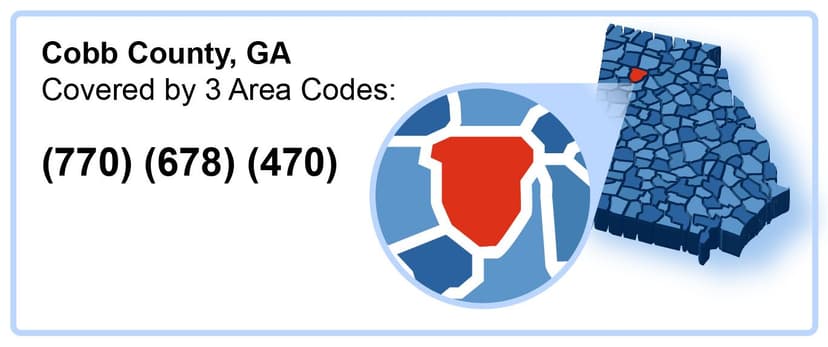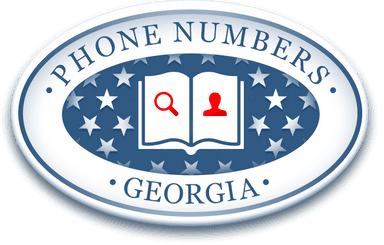What are the Best Cell Phone Plans in Cobb County?

Area codes represent the Numbering Plan Areas (NPA) in a state as designated by the North American Numbering Plan (NANP). They are the three-digit numbers that begin American phone numbers. Cobb County area codes identify the telephone service areas in the county.
Three active area codes cover Cobb County. They are:
Area Code 770
Area code 770 is a Georgian telephone code put into service in 1995. It was created from a split of the 404 NPA. Cobb County cities served by the area code 770 include Marietta, Acworth, Smyrna, Atlanta, and Powder Springs.
Area Code 678
Created in 1998, area code 678 overlays the 770 NPA. It serves the same locations covered by area code 770.
Area Code 470
This is an overlay for the 770 and 678 NPAs. The area code 470 covers the same Cobb County cities served by the 770 NPA.
The Georgia Public Service Commission (PSC) administers and manages area codes in the state of Georgia.
The 2018 CDC survey suggests that telephony services are fast shifting towards wireless services. The survey reported that an estimated 59.0% of adult Georgians had adopted wireless-only telephony services while a small 3.5% of them used landline-only services. A large part of the children population (under 18 years) in the state had also embraced cell phones over landline phones for telecommunication.
Cobb County is served by the major phone carriers in the United States. Some Mobile Virtual Network Operators (MVNOs) also exist in parts of the county, but all operate on the major networks' structures. In the City of Marietta, Verizon and T-Mobile claim the best coverage at 94% while AT&T offers 84% coverage and Sprint covers about 72% of the city. These carriers provide varying degrees of network quality, depending on locations within Cobb County.
As wireless services adoption in Cobb County grows, the use of Voice over Internet Protocol (VoIP) telephony service is also increasing. VoIP allows residents to make both long and short distance phone calls at lower rates. Conversations are transmitted via broadband internet connections.
What are Cobb County Phone Scams?
Cobb County phone scams are frauds perpetrated against residents of the county using telephone services. They are committed through telephone calls, text messages, and voicemail messages. Phone scammers employ various tricks to steal their targets' personal information and money. However, the Federal Communications Commission (FCC) provides information on scams to educate the public on how scammers operate.
The Georgia Office of the Attorney General protects residents from losing money to scammers by providing vital tips to avoid scams. The Consumer Protection Division of the Attorney General's Office accepts complaints from residents who are victims of scams through its online complaint form. Persons in Cobb county who may have reasons to believe they have been scammed can also report to the Division by calling (404) 651-9018. The commonly perpetrated phone scams in Cobb County include:
What are Medicare Phone Scams?
Medicare phone scams are typically targeted at senior residents in Cobb County. Seniors who are over the age of 65 are generally entitled to use Medicare Insurance. When scammers call, they introduce themselves as employees of Medicare to request personal information. In most instances, they claim there is a necessity for information updates and request that their targets provide Medicare numbers to complete such updates. Once they acquire this information, they bill Medicare in their targets' names and take the money.
Medicare warns senior residents never to disclose personal information over the phone to persons who pose as their representatives. They also advise seniors to check their claims statements regularly for errors and report observed fraudulent charges by calling 1 (800) 633-4227. Cobb County senior residents who fall victim to Medicare scams can file their complaints online with the Federal Trade Commission (FTC) or call 1 (888) 382-1222.
What are Tech Support Scams?
Do not trust persons who call you out of the blue claiming to be tech support staff from your computer company. They are potential scammers, and reverse phone number lookups can uncover the real identities of such persons. As a variation to this scam, fraudsters will contact unsuspecting targets and say that they have detected viruses on their computers. They will then request remote access to such PCs. Once they gain access to computers, they tweak the settings in ways that would leave them vulnerable to viruses and other malware. They may install malware that would steal targets' sensitive information from their PCs to perpetrate financial fraud. Tech support scammers' primary aim is to make money off their targets, and not to protect their computers.
Cobb County residents must be wary of giving unknown persons remote access to their PCs. Residents who have fallen victim to this scam can have their computers checked for unusual malware and delete them. They can report identity theft to the FTC while also filing the reports of such engagements online with the Commission.
What are Utility Scams?
These scammers pretend to be representatives of utility companies. In recently reported cases in Cobb County, some residents were called by scammers claiming to represent utility companies and claimed that their check payments were not honored. Once they have their targets' attention, they will emphasize that their returned checks have left them with outstanding bills that must be paid immediately. They will ask targets to provide their credit card information to make the payment right over the phone or risk immediate service disconnection. At other times, they will demand payment by gift cards.
Cobb County residents should know that the county's utility companies do not engage people over the phone on outstanding bills. They also do not request payment via irregular channels. Utility scams in Cobb County can be reported to the Cobb County Sheriff's Office by calling (770) 499-4600. Alternatively, persons who have fallen victim to utility scams can register their complaints online with the Consumer Protection Division of the Attorney General's Office.
What are Lottery and Sweepstakes Scams?
If you receive a phone call from someone who says you have won a lottery or sweepstakes you did not enter for, the right thing to do is hang up. Search the caller's identity using applications that offer phone number lookup free services and report the incident to the Cobb County Sheriff's Office on (770) 499-4600.
In this scam, fraudsters will inform their targets to pay some fees to receive their prizes. Their preferred means of receiving payments are gift cards, wire transfer, and cryptocurrencies. Scammers will dispatch fake checks to their victims, knowing that they will be returned after a few days of depositing them in their bank accounts. In that time, the fraudsters would have fled with the paid fees and leave victims liable for those fake deposited checks. If you think you have been a victim of this scam, you can report your experience online to the Attorney General's Office. You can also file your complaints with the FTC by calling 1 (888) 382-1222.
What are Robocalls and Spam Calls?
Robocalls contract auto-dialers to deliver recorded messages via telephone calls. Telemarketers, government, and politicians use robocalls in disseminating information efficiently to a broad audience. However, fraudsters now prey on unsuspecting people by using robocalls. In many cases, they spoof Caller IDs to take on the identities of legitimate entities to perpetrate scams. Cobb County residents can confirm if phone calls from unknown numbers are robocalls by doing reverse phone lookups. The FCC provides tips to stop robocalls and avoid phone scams on its website. These action steps will prevent you from falling victim to robocall scams:
- End a phone call once you realize it is a robocall. Ignore the instructions to press specific buttons as following them will lead to more robocalls.
- Report robocall numbers to the FTC online or by calling 1 (888) 382-1222.
- Add your phone number to the FTC's Do Not Call List to stop receiving telemarketing robocalls. If you receive unsolicited calls after the 31st day of registration, they are potential scam calls.
- Block robocall numbers by using the call-blocking applications on your cell phone. You can also contact your phone provider for tools used to block spam numbers.
How Can You Spot and Report Cobb County Phone Scams?
Phone scammers are adept at claiming to be what they are not. They sound convincing when engaging unsuspecting targets. They usually take advantage of targets' ignorance to steal their hard-earned money and obtain sensitive information for identity fraud. If Cobb County residents must fight the menace phone scams, they must be familiar with the signs of phone scams, which include:
- Callers who pretend to be employees of government agencies to request sensitive information are scammers. Some of the information they inquire include social security numbers, passwords, and bank account information.
- Scammers will claim to be calling from the Sheriff's Office and threaten you with arrest or deportation if you fail to pay some money. Law enforcement agencies will never threaten residents with arrest over the phone.
- Unknown callers who ask you to pay money in exchange for products or services via prepaid cards, wire transfers, or bitcoins are potential scammers. Some of them will even request that you provide your credit card information.
- Scammers seek immediate payments without giving you time to think about their offers. Legitimate businesses will never pressurize you to buy what they offer.
- Scammers will offer free services or tell you that you won a prize. To enjoy such services or claim your prize, they will request that you pay some fees.
The FTC advises that the best way to avoid falling victim to phone scams is ignoring calls from unknown phone numbers. However, Cobb County residents who have been victims of phone scams can choose from various consumer protection agencies to file their reports. Some of them include:
Federal Communications Commissions - The FCC is the government agency that regulates all forms of communication in the United States. It provides guides to residents on how to stop robocalls and avoid phone scams. Cobb County residents can report illegal and spoofed robocalls to the FCC online or by calling 1 (888) 225-532.
Cobb County Sheriff's Office - The Sheriff's Office is the law enforcement agency within the county. It protects residents from falling victim to scams by providing scam alerts. Persons who believe they may have been victims of phone scams in the county can report to the Sheriff's Office at:
Public Safety Building, 2nd Floor
185 Rosewell Street
Marietta, GA 30090
Phone: (770) 499-4600
Georgia Office of the Attorney General - The GOAG is Georgia's principal consumer protection agency. It educates residents with scam tips and suggests how to avoid phone scams. Phones scams perpetrated in Cobb County can be reported to the GOAG online or by calling (404) 651-8600.
Federal Trade Commission - The FTC manages the National Do Not Call List. Residents who enroll their phone numbers on the list are not likely to fall victim to unwanted calls. Cobb County residents can file complaints of robocalls scams and other phone scams online with the FTC. They can also contact the Commission on 1 (888) 382-1222.
